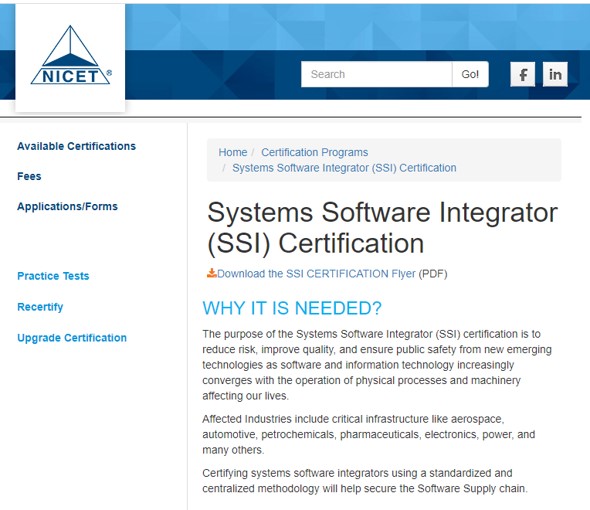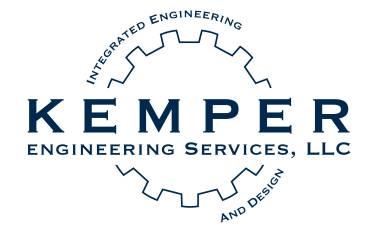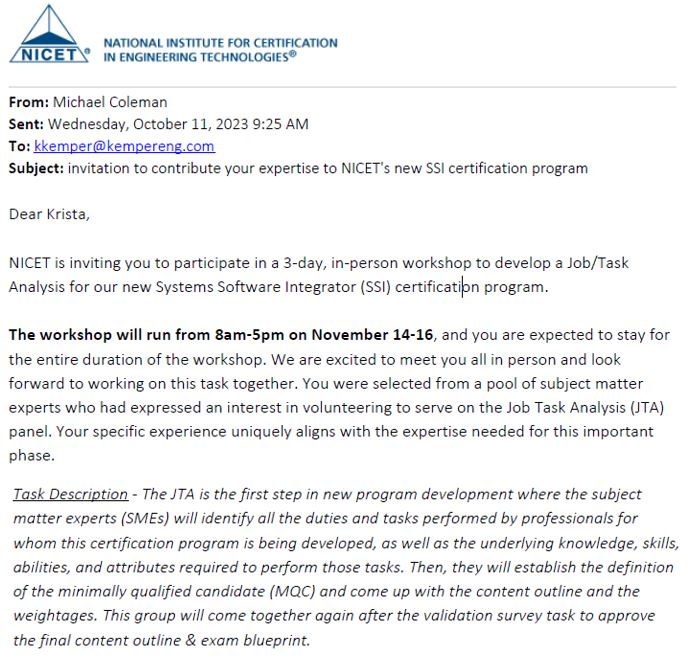Krista Kemper was selected by National Institute for Certification in Engineering Technologies (NICET) as a subject matter expert to serve on the Job Task Analysis (JTA) panel. Her progression through the ranks in software quality assurance and testing, to include designing and managing a test lab for new Adobe products, plus her years in traditional engineering and management led to her selection to attend the working conference in Virginia next month. Krista has been part of the National Society of Professional Engineers (NSPE) task group addressing software-related issues such as the 737MAX crashes and autonomous vehicle issues since 2019. Working with multiple industries, this has progressed to the development of the Systems Software Integrator (SSI), a specific best-practice role that has been key to successful equipment development. The lack of a designated person in this role a key deficiency associated with significant failures.
The SSI is the person who works as the software lead to the project manager, on par with “structural lead”, “electrical lead”, and other key positions used in traditional engineering. In traditional engineering there is no “we’ll fix it by pushing out a patch” — everything has to work when it is sent out. While most software projects will not need an SSI, the intent of having the SSI is to have a person who is not only certified to be a cross-discipline expert within the software industry, but is also the person that is trained to work with the rest of the engineer team to understand what questions to ask to develop software requirements, testing protocols, and ultimately deliver a full systems integration test. The intent of certification is to have a person, like a licensed engineer, who is legally required to put public safety first such that if they allow software to be substandard, they could lose their certification as a reportable event. They will also document the Software Bill of Materials (SBOM) and the Artificial Intelligence testing, which are federal requirements in response to Executive Orders. The SSI should be the person required to make legal attestation for requirements by the federal government, which is likely to continue to change and evolve over time. Keeping up to date with regulatory requirements along with annual ethics training will be a major element of the continuing education for SSI certification along with keeping current with technology.
Software development does not have the same degree-base requirements traditional engineering does because many software projects do not have the consequences of engineering projects. Krista understand the impact of engineering failures, whether it is software-driven or by other root causes. She is a veteran of the US’s involvement in Somalia and witnessed first-hand the price that is paid when people skip steps in a process to save time or assume they are so good they can take short cuts. She also understands how the typical processes in software do not have the “hard stop” of an engineering review and how marketing can drive a product launch. She is honored by being selected, but is even more honored to “represent the testers” and help lay the foundation for software professionals who wish to take on the responsibilities associated with projects that impact public safety, health, and welfare. This is part of Kemper Engineering’s outreach efforts to serve the profession and the public.

NICET’s listing for the Systems Software Integration certification. It is not “just an idea” at this point. It’s a solution to existing and developing challenges.


Recent Comments